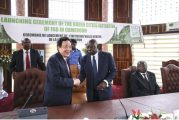Categories
Recent Posts
- Southern Cameroons refugees in Nigeria receive farm seedlings
- Douala: Investment Forum wraps up with honors for investment champions
- Understanding the Biya Francophone regime’s support for the Israeli genocide in Gaza
- US: Prosecution lays out ‘criminal conspiracy’ as Trump’s hush money trial opens
- FAO formally launches Green Cities Initiative in Cameroon
Archives
- April 2024
- March 2024
- February 2024
- January 2024
- December 2023
- November 2023
- October 2023
- September 2023
- August 2023
- July 2023
- June 2023
- May 2023
- April 2023
- March 2023
- February 2023
- January 2023
- December 2022
- November 2022
- October 2022
- September 2022
- August 2022
- July 2022
- June 2022
- May 2022
- April 2022
- March 2022
- February 2022
- January 2022
- December 2021
- November 2021
- October 2021
- September 2021
- August 2021
- July 2021
- June 2021
- May 2021
- April 2021
- March 2021
- February 2021
- January 2021
- December 2020
- November 2020
- October 2020
- September 2020
- August 2020
- July 2020
- June 2020
- May 2020
- April 2020
- March 2020
- February 2020
- January 2020
- December 2019
- November 2019
- October 2019
- September 2019
- August 2019
- July 2019
- June 2019
- May 2019
- April 2019
- March 2019
- February 2019
- January 2019
- December 2018
- November 2018
- October 2018
- September 2018
- August 2018
- July 2018
- June 2018
- May 2018
- April 2018
- March 2018
- February 2018
- January 2018
- December 2017
- November 2017
- October 2017
- September 2017
- August 2017
- July 2017
- June 2017
- May 2017
- April 2017
- March 2017
- February 2017
- January 2017
- December 2016
- November 2016
- October 2016
- September 2016
- August 2016
- July 2016
- June 2016
Featured
 Understanding the Biya Francophone regime’s support for the Israeli genocide in Gaza
Understanding the Biya Francophone regime’s support for the Israeli genocide in Gaza  Poverty under Biya: Cameroonians embrace Chinese language for brighter futures
Poverty under Biya: Cameroonians embrace Chinese language for brighter futures  Cameroon is broken: Who can fix it?
Cameroon is broken: Who can fix it?  Ethiopia: U.S Senator Cardin Statement on the Killing of Bate Urgessa
Ethiopia: U.S Senator Cardin Statement on the Killing of Bate Urgessa  Battle for the Unity Palace: ANNOUNCEMENT!
Battle for the Unity Palace: ANNOUNCEMENT!
Most Commented Posts
 4 Anglophone detainees killed in Yaounde
4 Anglophone detainees killed in Yaounde
19 comments Chantal Biya says she will return to Cameroon if General Ivo Yenwo, Martin Belinga Eboutou and Ferdinand Ngoh Ngoh are sacked
Chantal Biya says she will return to Cameroon if General Ivo Yenwo, Martin Belinga Eboutou and Ferdinand Ngoh Ngoh are sacked
13 comments Anglophone Nationalism: Barrister Eyambe says “hidden plans are at work”
Anglophone Nationalism: Barrister Eyambe says “hidden plans are at work”
12 comments The Anglophone Problem – When Facts don’t Lie
The Anglophone Problem – When Facts don’t Lie
12 comments Largest wave of arrest by BIR in Bamenda
Largest wave of arrest by BIR in Bamenda
10 comments
Latest Tweets
Featured
-

Southern Cameroons refugees in Nigeria receive farm seedlings
-

Douala: Investment Forum wraps up with honors for investment champions
-

Understanding the Biya Francophone regime’s support for the Israeli genocide in Gaza
-

US: Prosecution lays out ‘criminal conspiracy’ as Trump’s hush money trial opens
-

FAO formally launches Green Cities Initiative in Cameroon
-

Football: Barcelona wants Clasico replay if Yamal ‘ghost goal’ call wrong
-

Poverty under Biya: Cameroonians embrace Chinese language for brighter futures
© Cameroon Concord News 2024
23, December 2020
Cameroon Catholic Community Mulheim: Archbishop Nkea reflects on contribution of pastoral council 0
The Chairman of the Cameroon Catholic Community in Germany has described the relationship of the parish pastoral council with the Diocese of Mamfe which was introduced by Bishop Emeritus Francis Lysinge as truly remarkable adding that “The challenge the Cameroon Catholic Community in Mulheim an der Ruhr in Germany faces is not just about reopening communications with the Diocese of Mamfe but also establishing cooperation between the two entities.”
Chairman Julius Ndifor held a very intensive and productive meeting with the Metropolitan Archbishop of the Bamenda Archdiocese and the Apostolic Administrator of the Diocese of Mamfe, His Grace Archbishop Andrew Nkea.
Speaking to His Grace Archbishop Andrew Nkea in Bamenda recently, the Chairman of the Cameroon Catholic Community in Germany said “the Cameroon Catholic Community is much richer through the contribution that the Diocese of Mamfe has made”.
The Archbishop was very begeistert that the Pastoral Council addressed a letter to him with the intention of recommencing cooperation.
Chairman Ndifor reportedly described the historic meeting as warm, welcoming and positive, especially as the Metropolitan Archbishop was pleased as he received a Christmas greeting card from the Cameroon Catholic Community in Germany.
For his part, the Archbishop agreed to reopen cooperation channels with the Cameroon Catholic diaspora community in Germany.
Archbishop Andrew Nkea paid tribute to the way in which lay men and women in Mulheim clearly took on responsibility to keep the faith in the Roman Catholic Church and added that the Diocese of Mamfe will look at how it can continue to help the Cameroon Catholic Community in Mulheim to mature, to develop and to become sustainable as times change.
Archbishop Andrew Nkea reminded the Cameroon Catholic Community German emissary of the new missionary mode as decreed by the Holy Father Pope Francis which is that of reaching out to young people, fostering programmes of faith formation and development, ensuring that each community is a caring presence in the wider community in which it exists.
By Tanyi Tambendiparrah